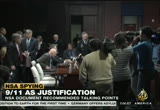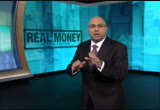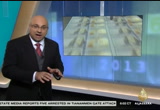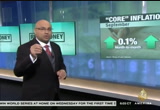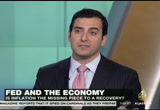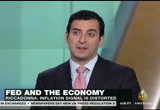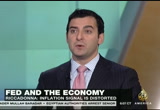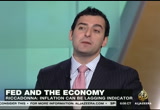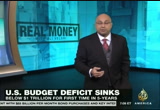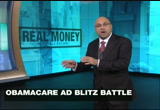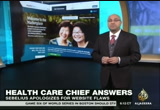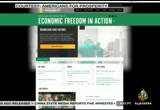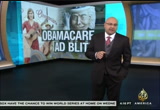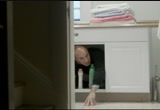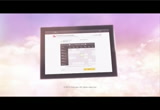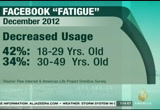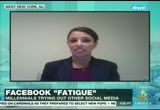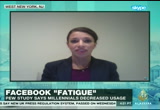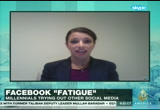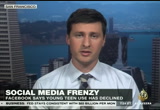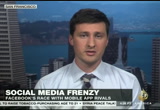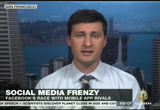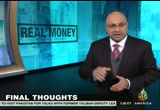tv Real Money With Ali Velshi Al Jazeera October 30, 2013 7:00pm-7:31pm EDT
7:00 pm
>> this is al jazeera america in new york, tony harris. here is a look at today's top stories. >> you deserve better. i apologize. i'm accountable to you for fixing these problems. >> health and human secretary kathleen sebelius said that the healthcare.gov website will be fixed by next month. president obama compared it to the early difficulties that massachusetts had with their health program. national security agency officials were required to
7:01 pm
justification for mass surveillance. it's listed under sound bite that resonate and did not comment on the document. a cease-fire allowed syrians to be evacuated. the area had been under seen for almost a year. the assad, rebel groups and aid workers all agreed to the evacuations. some critics say freeing the area of the area gives assad tactical advantage to clear rebels from damascus. "real money with ali velshi" is next. >> like this baby, facebook blows away sales and profit estimates. i'll tell you what the company is doing right and what risks it faces. what 80,000 items from bacon to
7:02 pm
flat screen t.v.'s. all have in common. and does jennifer hudson have the medicine son that kathlee tn sebelius needs to revival obamacare? i'm ali velshi. this is "real money." >> reporter: this is real money. you are the most important part of the very. join our live conversation for the next half hour on twitter at a.j. real money. the federal reserve has just spent two days discussing what it's going to do about this economy. for now the fed plans to stay the course continue pumping $85 billion a month into the financial system and that has the affect of keeping interest rates down. the fed says it's too early to taper that stimulus in part because the government shutdown set us back a bit but they still
7:03 pm
cite a week jobs picture. 10,000 private sector jobs were added in october. that's not the monthly government jobs report. we'll get one of those on november 8th. this is from the payroll firm adp but it's generally seen as a predictor of what the government number will say especially since the vast majority of jobs created these days are in in fact, in the private sector. 130,000 is well below the average for the last 12 months. how does this connect back to the fed? lower interest rates were meant to encourage lending making money cheap to borrow. that's supposed to help firms expand and increase their hiring, make people spend more but companies aren't doing that at the speed that the fed would go like. and low interest rates do come with one potential danger. they can fuel inflation. the fed doesn't have to worry about that just yet. we learned that the prices in september rows .1% or core goods
7:04 pm
and services. that excludes volatile food and energy prices. those same core prices are up 1.7% compared to the same time last year. if you're wondering how this, the consumer price index is figured out listen to this. >> reporter: cpi a measure of the change in prices of about 80,000 items in a bask of goods and services that range from bacon to bananas, from lawncare to dental care, from toys to tuition. from apartment rent to the hotel bill. it's all stuff that ends up on the shopping lists of some 28,000 urban families who keep records examined by government workers. those workers track prices for everything from ice cream to flat screen t.v.'s at 23,000 retailers, service businesses, food trucks, even vending machines. once crunched the numbers measuring price changes and
7:05 pm
weighing each item according to its importance in the family bunch, and out comes an average and that number is inflation. >> reporter: we're not talking about ben bernanke's or eating or viewing habits but for that we go to carl at deutsche point. if you take out food and energy--by the way, why do we take out food and energy? >> econists consume a lot of food and energy as well but those are volatile components. if we think of what gas price versus done over the past two or three years, if you were trying to set monetary policy based on an inflation metric that was moving up and down over and out due to energy price moves which often then bleed into food prices as well, it would be disaster. >> so you take this core thing, this no food and energy in inflation increase over last year. september to september, is it good, bad, is it where we should
7:06 pm
be? >> it's a decent print. we need a little bit of inflation in the economy to keep things moving. the fed wants that closer to 2%. we're close to the target but it's a tale of two inflation metrics. if we divide that into goods and services, the goods component is extremely weak and it's in negative territory right now. that's holding down the overall metric. it's making it look misleading it low. >> even though it's a broad measure. >> exactly. the reason that's happening is because the dollar has been strengthening. it's up 5% compare to most of our major trading partners. the strong dollar means that import prices stay down and import fries ar prices are fall. it's a sign of a strengthening dollar. and the service sector where metrics are going up about 2.5%. >> the fed was concerned about
7:07 pm
the affect of washington's dithering and debating on the economy. they weren't entirely clear about it, because the feds are never entirely clear on anything. but they did imply if you were thinking about pulling out $85 billion a month, the stuff in washington caused them to be in that business a little longer. >> absolutely, it's caused it for a couple of reasons. first of all, the government shutdown. if we look at consumer confidence, the manufacturing survey, the non-manufacturing survey, all of those seem to have weakened late september into october probably in alps of the government shutdown. that's part of the problem. the other part of the problem the date it was has gone missing. with the government shutdown they were not tabulating things like employment, inflation, and these metrics.
7:08 pm
so they went into the october meeting with not a whole lot more information than they had in the september meeting. >> good news, how long do you think the feds will say we can't keep putting $85 million in the economy. >> the feds need to see more evidence that we're running in the right direction. so they don't pull out too soon and then have to jump right back into the market. the next meet something in december. i don't think we'll see a significant improvement between the labor day at a between now and then that will convince policymakers that the time has come to taper asset purchases, and now ben bernanke, will be leaving and so the next meeting will be the march meeting. that's when janet yellen, that's her first meeting as fed chair. in my view by the time we get to
7:09 pm
the march meeting, the economy will have strengthened, and the labor market will have strengthened. >> our viewers should remember that mortgage rates will be something that happens before that. it doesn't always depend on what the fed does. it's what they think it's going to do. >> yes. >> carl, senior economist at deutsche bank. how to narrow the gap between what the government takes in and what it spends. that shortfall is called the deficit on wednesday the treasury department said that the government took in $75 billion more than it spent in september. a spur plus: now that's just one month and the deficit has not gone away but it helped narrow the deficit to just $680 billion. hey, don't laugh at that. that's the lowest since 2008, and it's a drop of 38% from the prior fiscal year.
7:10 pm
deficit spending widened during the recession, we know that. but it has since narrowed because of economic recovery, spending cuts and especially tax hikes because it took affect this year. bank of america said that the u.s. could file a civil lawsuit according to the wall street journal citing a regulatory filing. b. of a. losses could rise above $5 billion. big banks are facing a rash of legal action when the economy went south and the housing crash. jennifer hudson, kathleen sebelius, and how the battle to save or kill obamacare is playing out to hollywood. we have that and more. keep it right here.
7:12 pm
7:13 pm
price for healthcare. while president obama is in boston promoting the system and doing damage control. the president obama spot at nathaniel hall where it all started seven years ago, mitt romney signed the massachusetts health reform law which the obamacare is modeled after. signing up 3 million young healthy people in the first year. that group of people is so important that the government has recruited hollywood heavyweights to lure them in with videos. >> seduced by one side. >> my company's healthcare, it doesn't cover mammograms. >> the aca covers preventive care for women's health. >> scared by the other. >> take your pants off. >> the online site to attract obamacare's most crucial buyers, the young and healthy like these filmmakers in los angeles. >> i think people in our age
7:14 pm
group are more concerned with their finances than their well-being. so it's tough. i don't know if that video gets that point across. >> reporter: that video featuring jennifer hudson spoofing "scandal" was produced by funny or die. a comedy website with 19 million unique viewers a month. the entertainers were enlisted to help sell young people on obamacare. funny or die is volunteering its time and resources to produce 20 videos and projects promoting obamacare. along with celebrities tweeting the white house is getting free advertising on social media, exactly where young people live. >> i like videos like this because they make light of a pretty serious situation. and maybe reach an audience that wouldn't know about things like this. >> reporter: according to the
7:15 pm
associated press the obama administration is reportedly spending $684 million a year on publish police the marketing, and twicing much of it parsed out to states for their own ad campaigns. [♪ singing ] >> reporter: the anti-obamacare camp is using the same tactic. the group generation opportunity which has received $5 million from the conservative billionaire koch brothers, $750,000 was earmarked for anti-obamacare initiative produced "creepy uncle sam" generating 3 million views on youtube and urge young people to opposite out of obamacare saying it's cheaper to buy private plans or pay a fine. generation opportunity, they're hoping to woo their audience away from obamacare and force a
7:16 pm
repeal of the law. >> telling washington they can do better than obamacare. >> reporter: both sides have their work cut out for them. a recent gallop pol gallup poll% of 18 to 35 years olds did not know that they had to buy insurance. it's unclear who is winning the information war. but for or against the videos are raising awareness. >> the negative one makes me want to say, hey, wait a second. i want to look this up. >> at obamacare we believe saying affordable healthcare so young people will love us. >> you want to know what we can cover, how much it's going to cost, and not just this weird take on the government screwing us. >> reporter: al jazeera. >> well, selling obamacare does not come cheap. aside from the money that the administration is spending an additional $1 million will be spent for insurers on tv spots.
7:17 pm
7:19 pm
>> facebook is on a roll. it's third quarter earnings report blew past analyst expectation and its stock has jumped more than 150%. the social media giant was able to silence critics. facebook has risen to the challenge but user may be feeling a bit of facebook fatigue. a few survey show 42% of facebook users ages 18 to 29, and 34% of those 30 to 49 have reduced their usage.
7:20 pm
20% say they no longer use facebook at all. a millennial in new york who said she uses facebook less than she used top. thank you for being with us. you are the demographic that we think of when we think of facebook. but this study suggests that some of you on the younger side of this demographic are not using it as much. give me a sense of your history with facebook in terms of your usage? >> sure, well, i'm a social media marketer. i've had to use facebook specifically every day for business marketing, but on a person level that recreek tha ct you mentioned is certainly the case. i only navigate to facebook when prompted by mobile notifications saying that i have a message or i was tagged in something. >> but to some degree once you're there, do you ungauge
7:21 pm
with it differently? facebook would love to hear that you engage with it because you hear these mobile notifications, then there is an ad and you go buy something. what do you use it for? >> it's very easy to ignore all that and just do what you need to do and get off. because it's become overwhelming. there is so much content, so much wording that with competing social media channels like instagram you can just see what you want to see visually and get off of the channel. >> you do post things to facebook? >> i do, but much less frequently. now i would say rather than daily status updates i'm lucky if i get to it once a week, and usually it will be something less personal. it will be a news story that i read that i thought was interesting, or some sort of event that i think others should check out. >> how did this pattern develop? were you at the front end of your peer group doing this, or did you do it because your
7:22 pm
friends or people you associated with moved off to other social media platforms? >> i would say it's a combination. it certainly started because of all the privacy complications. as that process became more complicated and you had to filter and create lists in order to really share what you wanted to share with the select group of people, it really just became so time-consuming, and it was much less--it was much lessen joyible, honestly. >> where do you end up going? do you use social media or do you back off of social media in general and then what is taking up the time. >> i use social media every day and instagram every day and vine. i can see what my friends are up to and not have to read through facebook status. i can visually see what they're up to. double pass, they know i like
7:23 pm
it, i've seen it. that's an acknowledgment that that's awesome and i move on with my day. when you're a working professional you don't have time to go through all the status updates and comment on all them. >> great to talk to you. joining us from new jersey. how has your use of facebook changed since you first joined. rebecca tweets, i stopped using it because of privacy settings, and this is my favorite one. rick said, way, way, way, way, way, way, way, way, way, way, way down. used my is 40 characters. i like that, that's great. tell me what you think by tweeting me or leave us a comment on facebook or anywhere you want to leave us comment. i need to get a vine and
7:24 pm
whatever else, and instagram thing so people can leave comments there, too. facebook exposed a declinfacebog use, kirk, you heard some of those comments. is that in keeping with what you heard about user activity on facebook? >> yes, absolutely. i mean, a lot of it has been anecdotal because facebook does fought break out it's user demographics by age. in order to see if younger people are shying away from facebook we have to listen to stories. but they did say on their earnings call today while younger teens were stable between q 2 and q 3 with overall monthly actives, it did decline. we don't know what age group that is, but it scared some
7:25 pm
investors that the stock went down after that. >> you saw the stock go up and then it went down. kurt, one has to imagine, i'm not in this world. i'm certainly not a guy who invented this, but you got to imagine when facebook comes out. it's so new, so groundbreaking, at some point the fascination factor of spending hours and hours on facebook which i admit i have done in the past, it gets old and you move on to other things. >> yes, when facebook is competing with so many other social networks that are giving people away to share things that are easier to digest. pictures or videos, the visual aspect is a little bit nicer and while people still share pictures to facebook when you can go to instagram and put a filter on or snap chat and do things that may be quicker or more spur of the moment, those types of use cases are helpful, and facebook is now competing
7:26 pm
with that. >> even if my viewers are wondering if they lose users to instagram, that's also their company. i don't know if it costs them in the end. has facebook done a good job, and what does the future of facebook look at in mobile strategy. >> it has been a big emphasis for them pour the last 1 over os or so. they have since built native apps for the iphone or android phone. the thing for mobile about facebook that's where they expect to get their next billion users. not necessarily people here in the united states, but people in the emerging markets who don't have desk top computers, traditional landline internet, that they're going to be coming to facebook over mobile. something that they're putting a lot of time and energy to make sure that it works properly, and
7:27 pm
its giving them returns for share holders. >> facebook is around the $50 mark. those who bought it, finally made money off it. now twitter is on the horizon. if you had to look out there is this a space and different space for a very successful twitter and a successful facebook. or does facebook wane a bit and twitter gains a bitter or twitter wanes a bit and facebook gains. >> i think there is room for both of them. there is a fight for second screen users if you're watching the super bowl or presidential election or whatever it may be they want you to bring the conversation to their individual platform. twitter and facebook are fighting to make that happen. the more people are engaging around live television that will pro tell twitter, make them more
7:28 pm
wettive with facebook or extend the gap. but i think they're very different use cases in a lot of ways, and i think will is room for both out there. >> kurt, good to talk to you. your twitter handle is @kurt wagner 8. follow kurt. he knows about this stuff. people ask me about it, and i don't know as much as he knows. thanks, cut. >> thank you for having me. >> my final thoughts go out to the once embattled auto industry. they were headed to collapse, and the government stepped in, and saved them to the tune of $40 billion. the leaner company that came out of the bankruptcy. since then g.m. made a pretty good come back. they turned a profit in the their quarter. the stock is up 29% this year.
7:29 pm
that's still not enough to recoop all of the government's investment. the government wants its money out of g.m. the u.s. registered losses totaling $9.7 billion on the sale of its stock holdings in the company since 2010. it's expected to get out of g.m. completely by early next year. so that number will go up a little bit. whatever your opinion of bailouts and government interference, more than a million jobs were probably saved because of the government's action. it might have cost the taxpayers three times the amount of the g.m. bail out. the auto rescue may have given us all a return on investment. that's our show for today. uncovers unheard, fascinating news stories? it drives discussion across america. >> share your story on tv and online.
7:30 pm
>> hi. i am lisa fletcher. you are in the stream. is the republican party at war with its self over gay marriage? same-sex marriage is now legal in fourteen states. just before it came into effect for new jersey, republican governor chris christie quietly dropped his effort to stop those unions. now, some say his action or lack thereof shows a larger shift within the republican party on the issue of gay rights. earlier this year, the republican national committee voted
124 Views
IN COLLECTIONS
Al Jazeera America Television Archive
Television Archive  Television Archive News Search Service
Television Archive News Search Service  The Chin Grimes TV News Archive
The Chin Grimes TV News Archive 
Uploaded by TV Archive on

 Live Music Archive
Live Music Archive Librivox Free Audio
Librivox Free Audio Metropolitan Museum
Metropolitan Museum Cleveland Museum of Art
Cleveland Museum of Art Internet Arcade
Internet Arcade Console Living Room
Console Living Room Books to Borrow
Books to Borrow Open Library
Open Library TV News
TV News Understanding 9/11
Understanding 9/11
